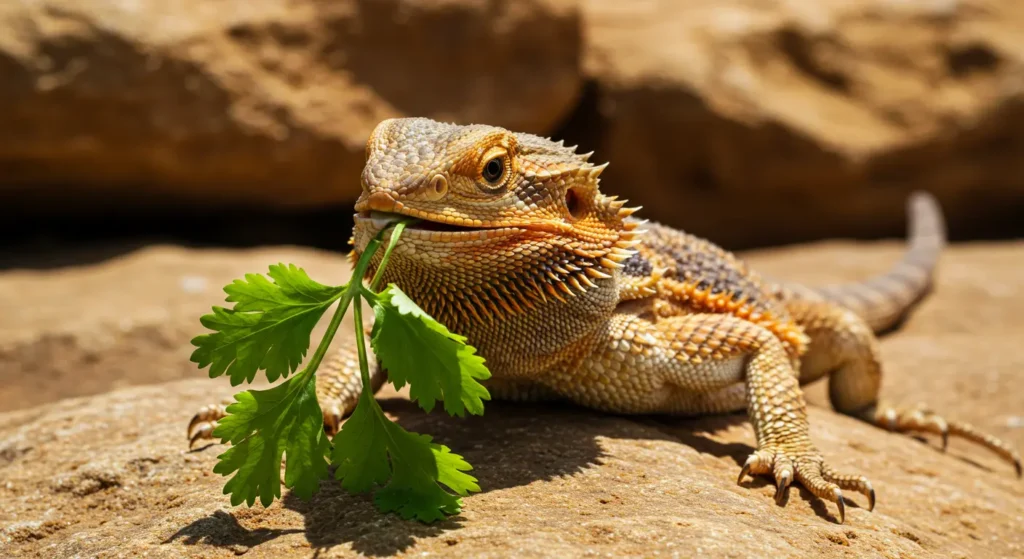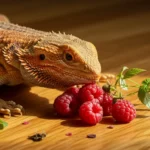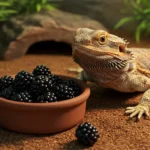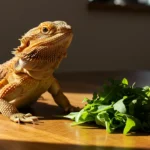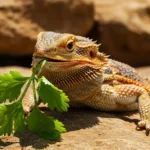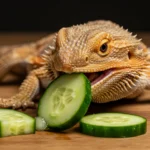If you’ve added cilantro to your own meals, you already know how fresh and flavorful this herb tastes. As a reptile owner, you may ask: can bearded dragons eat cilantro, and is it safe for them? Many pet parents want to add variety to their dragon’s diet, but they worry about choosing the wrong foods.
Cilantro, also called coriander leaves, contains vitamins, minerals, and antioxidants that support reptile health. But it also has a few drawbacks. That’s why owners often ask not only can bearded dragons eat cilantro but also how often should they have it.
In this guide, we’ll cover the benefits, risks, feeding frequency, and preparation tips for cilantro. You’ll also learn about other safe greens and herbs that balance your bearded dragon’s diet. By the end, you’ll know exactly when and how to serve cilantro without harming your pet.
Can Bearded Dragons Eat Cilantro Safely?
Cilantro is a popular herb in many kitchens, but pet owners often wonder if it’s safe for reptiles. When it comes to bearded dragons, the answer is yes—with a few important guidelines. Let’s explore the details so you can feed cilantro confidently.
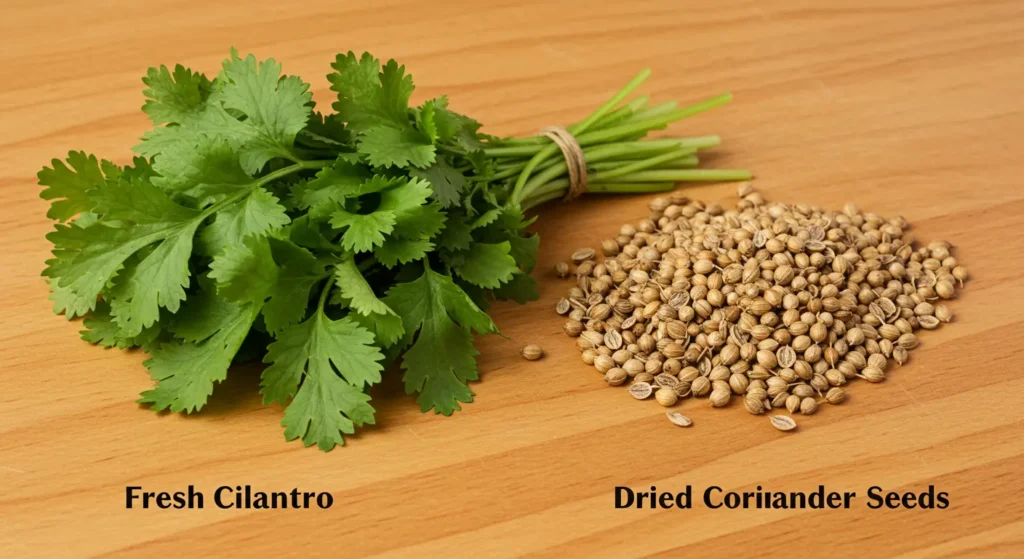
Cilantro vs. coriander: which one can bearded dragons eat?
Cilantro and coriander come from the same plant, Coriandrum sativum. The leaves and stems are called cilantro, while the dried seeds are known as coriander. Bearded dragons should only eat the fresh leaves and stems. The seeds are harder to digest and lack the hydration that the leafy parts provide. Always make sure you offer your dragon cilantro leaves, not coriander seeds.
Is cilantro toxic or safe for bearded dragons to eat?
Cilantro is not toxic to bearded dragons. In fact, it can be a healthy addition when fed in moderation. The herb contains vitamins, minerals, and antioxidants that support growth and immune health. However, it should never replace staple greens like collard or mustard greens. Instead, think of cilantro as a supplement that adds variety to your dragon’s salad.
Can baby bearded dragons eat cilantro too?
Yes, baby bearded dragons can eat cilantro, but in very small amounts. Young dragons need a diet higher in protein from insects, so greens and herbs should only be offered as part of a balanced mix. Chopping cilantro finely helps babies digest it more easily. Use it as a light garnish alongside staple vegetables rather than a main food source.
Nutritional Benefits of Cilantro for Bearded Dragons
Cilantro offers more than just flavor—it provides real nutritional value for reptiles. While not a staple, it can support your dragon’s overall health when used wisely. Here’s a closer look at the benefits.
Vitamins and minerals in cilantro that support bearded dragon health
Cilantro contains Vitamin A, which supports eye health and skin function. It also has Vitamin C for immune defense and Vitamin K for blood and tissue maintenance. Minerals like calcium, potassium, and manganese contribute to bone strength, hydration balance, and metabolism. While cilantro is not as nutrient-dense as staple greens, it still adds useful variety to the diet.
How cilantro helps digestion, hydration, and immunity
Fresh cilantro is about 92% water, making it a natural source of hydration. This can be especially helpful for dragons that don’t drink much directly from water bowls. The fiber in cilantro supports digestion by helping food move smoothly through the gut. Antioxidants also play a role in boosting immunity and reducing inflammation, keeping your bearded dragon healthier over time.
Can cilantro prevent common bearded dragon health issues?
Cilantro alone won’t prevent major illnesses, but it can support overall wellness. Its calcium-to-phosphorus ratio is slightly in favor of calcium, which is important for bone strength. By contributing hydration and antioxidants, cilantro may lower risks of dehydration and minor digestive upsets. However, it should always be part of a varied diet to avoid problems like metabolic bone disease (MBD).
How Often Can Bearded Dragons Eat Cilantro?
Cilantro is safe, but it shouldn’t be a daily food. Like many herbs, it works best as a supplement alongside staple greens. Understanding how often to feed cilantro helps keep your bearded dragon healthy.
Recommended serving sizes of cilantro for bearded dragons
Offer cilantro in small portions—just a few leaves at a time. Adult bearded dragons can enjoy cilantro once or twice a week mixed into their salad. Babies should get even less, since their diet relies more on insects than greens. Keeping servings small prevents overhydration and digestive upset.
Risks of feeding cilantro too often (oxalates and calcium balance)
Cilantro contains oxalates, natural compounds that can bind to calcium. Too much of it may lower calcium absorption, raising the risk of metabolic bone disease (MBD). While cilantro has a fair calcium-to-phosphorus ratio, it isn’t rich enough in calcium to be a staple green. Feeding it too often may unbalance your dragon’s diet, especially if other low-calcium foods are included.
How to tell if cilantro is causing digestive problems in bearded dragons
Some dragons tolerate cilantro better than others. Signs of digestive upset include watery stools, bloating, or a sudden change in appetite. If you notice these symptoms after feeding cilantro, reduce the amount or stop offering it for a while. Monitoring your dragon’s reaction helps you adjust portions to match their needs.
Best Ways to Feed Cilantro to Bearded Dragons
Cilantro is easy to prepare and can add flavor to your dragon’s meals. To keep feeding safe, it’s important to wash, chop, and combine it properly. Here are the best methods for serving cilantro.
How to prepare cilantro safely before giving it to your bearded dragon
Always wash cilantro thoroughly to remove pesticides and dirt. Choose fresh, bright green leaves and avoid wilted or yellow ones. Chop the leaves and tender stems into small pieces before serving. This makes it easier for your dragon to chew and reduces the risk of choking.
Can bearded dragons eat cilantro with other staple greens?
Yes, cilantro pairs well with staple greens like collard, mustard, and dandelion. These vegetables provide the calcium and nutrients that cilantro lacks. Mixing small amounts of cilantro into these greens creates a balanced salad that your dragon will enjoy. It’s best used as a garnish rather than the main ingredient.
Tasty salad mixes with cilantro, veggies, and fruits for bearded dragons
You can get creative by adding cilantro to colorful salads. Mix it with leafy greens, shredded squash, or bell peppers for variety. For an occasional treat, add a few fruit pieces like blueberries or strawberries. These combinations not only improve nutrition but also make meals more appealing to your dragon.
Alternatives and FAQs About Cilantro for Bearded Dragons
Cilantro is a safe herb, but it shouldn’t be the only one in your bearded dragon’s diet. Offering a mix of herbs and greens ensures better nutrition and variety. Let’s look at some alternatives and answer common questions owners often ask.
What other herbs can bearded dragons eat besides cilantro?
Bearded dragons can safely enjoy several herbs beyond cilantro. Basil, parsley, dill, mint, and thyme are all reptile-friendly options when fed in moderation. These herbs provide different flavors and nutrients, making meals more interesting for your pet. Rotate them occasionally to keep your dragon’s diet varied and enjoyable.
Staple leafy greens that are healthier than cilantro for bearded dragons
While cilantro is safe, staple greens should make up the bulk of your dragon’s plant-based meals. Collard greens, mustard greens, turnip greens, and dandelion greens are excellent choices. They are calcium-rich, low in oxalates, and packed with essential vitamins. Rely on these as everyday foods, while keeping herbs like cilantro as occasional add-ons.
FAQs: Can bearded dragons eat cilantro stems, roots, or dried cilantro?
Bearded dragons can eat both the leaves and tender stems of cilantro. The stems are fibrous, so chopping them finely makes them easier to chew. Avoid feeding cilantro roots, as they are tougher and lack nutritional value. Dried cilantro should also be avoided because it loses water content and most nutrients, offering little benefit compared to fresh leaves. Always stick to fresh, washed cilantro when feeding your bearded dragon.
Conclusion: Should You Feed Cilantro to Your Bearded Dragon?
Cilantro can be a safe and healthy addition to your bearded dragon’s diet, but it should always remain a supplement—not a staple. Fresh cilantro leaves provide vitamins, hydration, and flavor variety, making them a nice way to enrich your dragon’s meals. However, they are low in calcium and contain oxalates, which means overfeeding can disrupt calcium balance and harm your pet’s health.
The key is moderation. Use cilantro occasionally alongside calcium-rich staple greens such as collard, mustard, and turnip greens. Preparing it properly—washed, chopped, and mixed with other vegetables—helps your bearded dragon enjoy it safely. Herbs like basil, dill, and parsley can also be rotated for extra variety.
By offering cilantro in the right portions and pairing it with healthier staples, you give your bearded dragon a diet that supports strong bones, healthy digestion, and overall well-being. Think of cilantro as a tasty garnish, not the main course. With balance and variety, your dragon will thrive on a diet that keeps it both healthy and happy.

